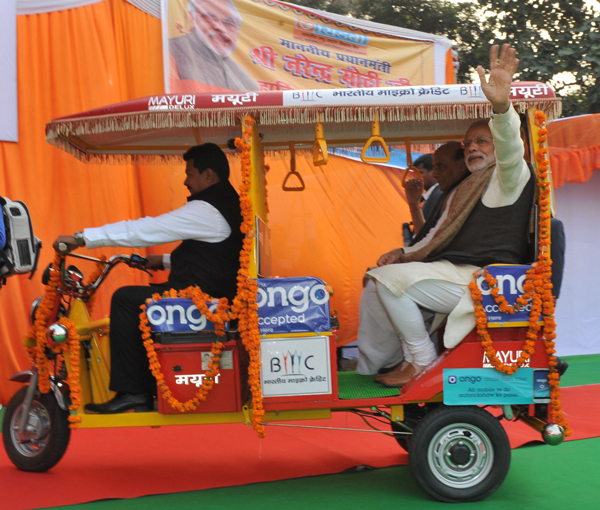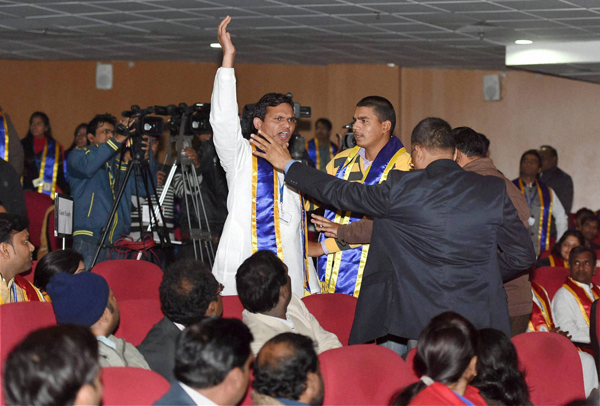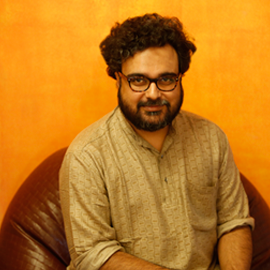'Pained' PM bypasses real issues behind Rohith's suicide

Rohith Vemula's suicide in Hyderabad has left Prime Minister Narendra Modi sad. Nothing less, nothing more. Just sad.
At the Babasaheb Bhimrao Ambedkar University in Lucknow on Friday, 22 January, Modi got emotional talking about the Dalit research scholar's suicide on Sunday.
In a choked voice, he said: "Rohith was forced to commit suicide."
There was a long pause, and pain and sorrow were clearly visible on his face.
"What would his family have gone through? Mother India has lost one of her sons."
"Whatever be the reason or the politics, a mother has lost her son. I can feel this pain."
And that was it.
Also read - What killed Hyderabad university Dalit scholar Rohith Vemula?
Modi restricted the whole issue to emotions, failing to address any of the real factors like injustice, discrimination, inequality and ideological differences, which led to Rohith's suicide.
When protests have erupted nationwide, people look towards the Prime Minister in hope. But Modi made no announcement of action, investigation or relief.
A day in the heartland
Modi was on a day-long tour of Uttar Pradesh - first, to his constituency Varanasi, and then state capital Lucknow. And it was clear that there were two things on his mind - the legacy of Dr BR Ambedkar, and the politics of the state.
In Varanasi, Modi spoke about how his government was pro-poor. He distributed equipment to persons with disabilities, labelling them 'divyaang', or divine organs. The equipment included sewing machines, Braille kits, hearing aids, smart canes and other smart devices. He then promised that his government would be devoted to the service of the poor and the downtrodden.
He also inaugurated the Varanasi-Delhi Mahamana Express train, before heading to Lucknow for other events. He was accompanied by UP Governor Ram Naik, Union Home Minister Rajnath Singh, who represents Lucknow in the Lok Sabha, and other party leaders.
The visit to Lucknow was the PM's first since his victory in the 2014 general election, and will pave the way for his party, the BJP, to begin its build-up to next year's Assembly elections.
Heat travels through the fog

PM Modi at the Rickshaw Sangh programme on 22 January. Photo: PIB
The convocation ceremony at the Babasaheb Bhimrao Ambedkar University in Lucknow was probably the perfect platform for the PM to break his silence on Rohith's suicide. After all, he would be addressing students, and that too at an institution named after India's biggest Dalit icon.
But little did he know that as he travelled through the foggy weather in UP, the heat generated by Rohith's suicide in Hyderabad was following him.
Rajnath spoke before the Modi at the event. His focus was on Swami Vivekananda and tales of Ram and Raavan. He said that without character, education and knowledge had no meaning. That's why the more knowledgeable Raavan lost to Ram. He concluded his short speech by quoting a poem by former PM Atal Bihari Vajpayee. He didn't mention the Hyderabad suicide at all.
The Home Minister's speech followed the set pattern of upper-caste politics, which has been observed in several RSS and BJP leaders' words in the aftermath of the suicide. He took the RSS line, and distanced himself from the entire issue, seemingly leaving the PM with a message - 'this is your burden, you handle it'.
Then, Modi stepped up to the podium to speak, and was immediately greeted by slogans like 'Narendra Modi murdabad', 'Narendra Modi go back', 'Inquilab zindabad' and others. It was indeed an embarrassing start to the speech.
Lessons from Ambedkar

Photo: Nand Kumar/PTI
Undeterred by the sloganeering, Modi began his address, urging students to follow the path shown by Ambedkar. He said Ambedkar didn't waste his time complaining, and that even after receiving a foreign education, he came back to India and devoted his entire life to the people of the country.
The PM said "failure is the fertiliser of success", adding that "the real problem occurs when we refuse to learn from the failures".
Then came the moment when he got emotional and spoke briefly about Rohith's suicide. But soon, he regained his composure and reiterated how India was a young nation, with young dreams.
Not all on the same page
Modi's method for firefighting the agitation inside and outside the venue, and around the country, was obviously to play the emotional card, punctuated by kind words about Ambedkar.
But people from his party and its parent organisation seem hell-bent upon undoing any positivity the PM may generate.
Around noon, BJP leader Subramanian Swamy tweeted: "The Hyd U drama is fast becoming the biggest con job of Communists and their running dogs."
The Hyd U drama is fast becoming the biggest con job of Communists and their running dogs
- Subramanian Swamy (@Swamy39) January 22, 2016Manmohan Vaidya of the RSS further added fuel to the fire. He told BBC Hindi: "How can those who support anti-nationals be allowed in the university campus?"
These comments are only going to add to the embarrassment of the PM and his government. They will only provoke further protests across the country, condemning the stand of the Hyderabad Central University and the Ministry of Human Resource Development.
Mere emotion is unlikely to douse this fire.
More in Catch - RohithVemula: 4 things Dalit intellectuals believe should shape our debate
We see Dalit as a problem, not a person. That's what killed Rohith Vemula
#HydStudentSuicide: here's how you got your "facts" totally wrong, Ms Irani!
Political theatre, dissent: why #RohithSuicide row won't die out anytime soon







![BJP's Kapil Mishra recreates Shankar Mahadevan’s ‘Breathless’ song to highlight Delhi pollution [WATCH] BJP's Kapil Mishra recreates Shankar Mahadevan’s ‘Breathless’ song to highlight Delhi pollution [WATCH]](https://images.catchnews.com/upload/2022/11/03/kapil-mishra_240884_300x172.png)

![Anupam Kher shares pictures of his toned body on 67th birthday [MUST SEE] Anupam Kher shares pictures of his toned body on 67th birthday [MUST SEE]](https://images.catchnews.com/upload/2022/03/07/Anupam_kher_231145_300x172.jpg)


_in_Assams_Dibrugarh_(Photo_257977_1600x1200.jpg)



